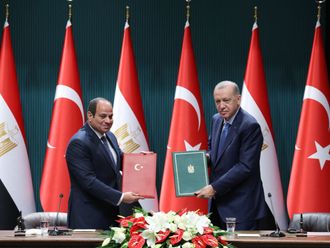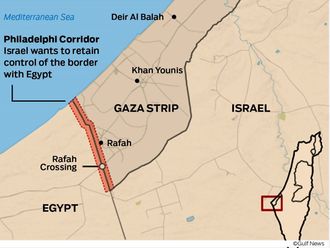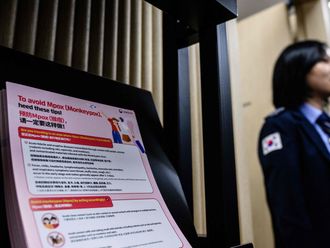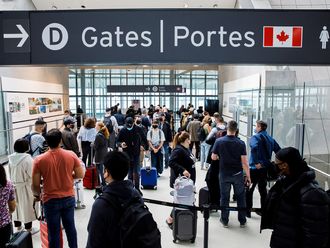Cairo: In a move unprecedented in the modern history of the Arab world against an Arab state, the Arab League yesterday slapped stringent sanctions on Syria in the strongest blow yet to President Bashar Al Assad's regime.
The League's ministerial council overwhelmingly approved the sanctions to pressure Damascus to end its deadly eight-month crackdown on dissent.
A defiant Syria condemned the move, calling it a "betrayal of Arab solidarity".
At a news conference in Cairo, Qatari Foreign Minister Shaikh Hamad Bin Jasem Bin Jaber Al Thani said 19 of the League's 22 member nations approved the sanctions while Iraq and Lebanon abstained. "We aim to avoid any suffering for the Syrian people," Shaikh Hamad said.
Arab League Secretary General Nabeel Al Arabi said the bloc will reconsider the sanctions if Syria carries out an Arab-brokered peace plan that includes sending observers to the country and pulling tanks off the streets. "We call on Syria to quickly approve the Arab initiative," he said.
The state-owned Al Thawra newspaper ran a front-page headline yesterday saying the Arab League is calling for "economic and commercial sanctions targeting the Syrian people." It said the measure is "unprecedented and contradicts the rules of Arab cooperation." Dr Abdul Hamid Radwan, a leading economist in the UAE Ministry of Foreign Trade, told Gulf News, "Not only will the sanctions hurt the Syrian regime but they will also place additional pressure on Syrian traders, who have not yet taken a stance against Al Assad's regime, and make them unable to pay for their imports."
Critical situation
"Unfortunately, Syrian citizens will also be hurt by the sanctions as they already face oil and gas shortages and increases in prices of commodities. The situation in Syria is getting very critical. Food prices are soaring, gas cylinders are not available in the market as well, so we are forced to store petrol in our houses," he added.
Mohammad, a Syrian citizen told Gulf News, "With the flights' suspension we won't be able to leave the country even for emergencies and travelling across the land borders of neighbouring countries is not safe as two families were killed in the last two days as they were leaving the country."
An Arab official who attended the League's meeting told Gulf News on condition of anonymity that "no Arab country was against the sanctions resolution," which is the first of its kind in the history of the League. Iraq, Libya and Sudan were slapped with sanctions in recent years, but they were imposed by either the UN or western nations.
The atmosphere of the meeting was "not tense, and the discussions were done in a friendly and brotherly manner," the diplomat said.
"One view expressed concern about the impact of the sanctions on the Syrian people, and everybody tried to avoid such an impact. The other view looked at sanctions as a way to make the Syrian regime comply with Arab demands," he said.
"At the end the aim of the move is to put pressure on the regime to meet the Arab demands."
Asked whether sanctions will make the regime harden its position, the official said, "The regime doesn't need the sanctions to be more stubborn. They are already inflexible."
Stern measures
- The sanctions include cutting off transactions with the Syrian central bank and halting Arab government funding for projects in Syria. However, basic food will be exempt.
- Syrian regime officials will also be prevented from travelling to Arab countries and their accounts will be frozen in Arab countries.
- The decision also called on Arab central banks to monitor transfers to Syria, except remittances from Syrians abroad to their families.
— With additional inputs from Jumana Al Tamimi in Cairo











